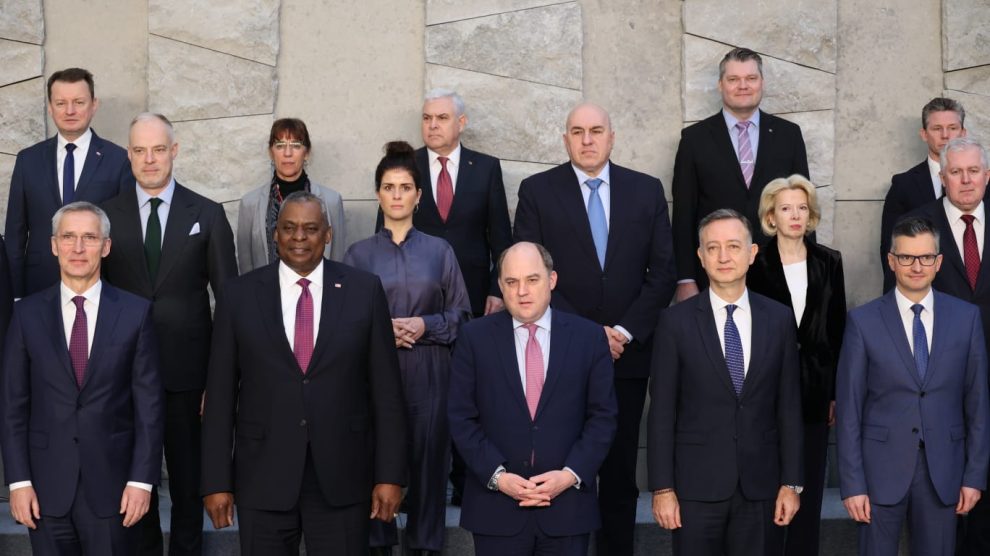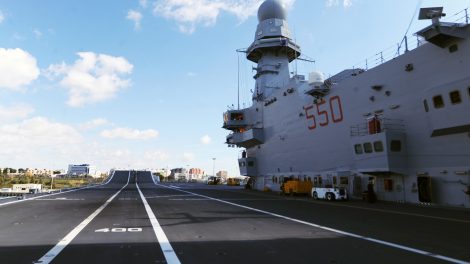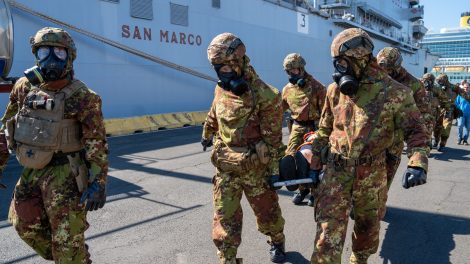More defence talks. Italian Defence Minister Guido Crosetto was in Brussels Tuesday through Wednesday, taking part in NATO-level talks with his counterparts at the Alliance’s Headquarters. Allies took stock of the economic, financial and military needs of the countries that want to contribute to the Alliance, as well as supporting Ukraine and NATO’s current posture ahead of the Vilnius Summit in July.
- “We need a strong and cohesive Alliance and, at the same time, greater bilateral cooperation between allied and partner countries, not only in the military field and in the relationship between Armed Forces, but also in the industrial and technological sector,” summed up the Italian Minister at the end of the two-day meeting.
- He signed several international agreements, namely five Letters of Intent and three Memoranda of Understanding.
Day one: Ukraine… Works started with an informal meeting session attended by NATO Secretary General Jens Stoltenberg, European High Representative for Foreign Affairs Josep Borrell, and the Minister of Defence of Ukraine, Oleksii Reznikov.
- Speaking with SG Stoltenberg, Minister Crosetto reiterated that “cohesion, unity and solidarity between Allies are our centre of gravity” and confirmed that “Italy will continue to support Ukraine with conviction while it defends its territorial integrity and independence,” according to an official note.
- He repeated as much to his Ukrainian counterpart. “To my friend Oleksii I reiterated Italy’s convinced support, [along with that of the EU and NATO], for Ukraine, for its freedom and right to the integrity, independence and defence of its people,” he later tweeted.
… and bilaterals. Minister Crosetto also met one-to-one with other colleagues, including US Secretary of Defence Lloyd Austin. “This was a new and important opportunity for discussion between Italy and the US to confirm their common commitment to facing new international challenges and helping Ukraine and its people to defend themselves,” reads the note.
- He also met with his Norwegian homologue Bjørn Arild Gram, with whom he discussed cooperation between the Armed Forces of Italy and Norway, including within the NATO framework;
- his Croatian colleague Mario Banožić, touching upon the international state of affairs, stability and security in the Balkans and cooperation in the area of defence;
- and with his Polish counterpart Mariusz Blaszczak for a “useful exchange of views on the strengthening of NATO’s Eastern Flank” where Italy is engaged with over 2,000 military personnel.
Day two: deterrence and defence. Wednesday’s session was devoted to those two core tenets, and was attended by the Finnish and Swedish Defence Ministers as representatives of the two invited countries. Their future entrance into NATO “will be an added value for our collective defence,” commented Mr Crosetto.
- The Italian minister held bilateral talks with his German counterpart Boris Pistorius and touched upon cooperation for international stability, support for Ukraine, the EU centre for the training of Ukrainian troops in Germany, and cooperation in the defence industry.
- He also met with his Swedish colleague Pal Jonson and discussed collaboration between the respective Armed Forces, reaffirming “the perfect harmony in the face of international challenges.”
- And he touched base with his Slovak homologue, Jarod Nad, to whom “he confirmed his willingness to pay increasing attention to the stability and security of the European continent.”
Towards 2%. That’s the target spending, in relation to GDP, that each NATO country should earmark for defence. “I raised the issue because the commitment that many NATO allies are demanding is to reach figures of 3-4%, and some nations are already at 4%,” said Mr Crosetto, noting Italy’s difficulty in reaching that self-imposed target.
- “You have to be serious, you cannot come here and say different things; I spoke about the Italian problems of linking that 2% to the budget that the country has to approve every year, and to the rules that Europe imposes linked to the budget.”
- Responding to a question on the reaction of German Defence Minister Boris Pistorius, he noted that the NATO ministers were not in Brussels “to engage in discussions or to seek anyone’s understanding.” Quite simply, he concluded, “everyone says and puts their reasoning on the table.”




